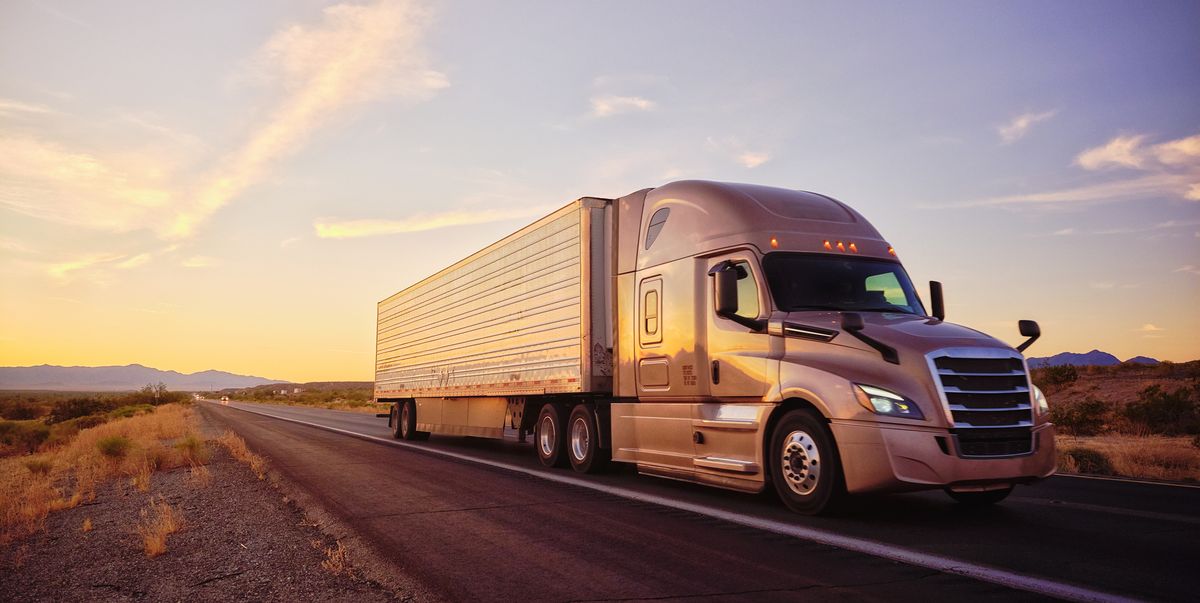
- Glenda Bennett used to design and make Diné (Navajo) inspired handbags, but people stopped buying when the coronavirus hit.
- She shut down her business and trained to become a semi-truck driver, and now crisscrosses the country with a different perspective behind the wheel of a Freightliner Cascadia tractor.
- Bennett told the Navajo Times her trainer recommended she carry a weapon after she explained to him how often indigenous women are targeted by criminals.
The coronavirus has forced all of us to make changes in our lives, but not many have gone from designing handbags to driving long-haul trucks. That’s exactly what Glenda Bennett, a 34-year-old Diné (also known as Navajo) from Arizona, did when things got tough earlier this year.
According to the Navajo Times, which interviewed her about the job change, Bennett used to focus on her own company, Glenda Bags, which was inspired by Diné culture and traditions in designs for a line of handbags. She made the bags with velveteen, leather, print, and traditional floral fabrics and told the paper that business was booming until around May. After that? “[Sales] just flatlined,” she said. “Most of it was because I wasn’t about to start pushing sales because I already knew that people don’t have money and people aren’t going to afford the things that I’m making.”
Bennett’s father recommended she look into truck driving to support her four-year-old daughter, and after six weeks of training and some time to process paperwork, she had a Class A commercial driver’s license (CDL) and found a job to hit the road. Her first trip took her from Oregon to the East Coast, then back to Washington State. Since then, she’s been rolling on and on and on across the country in a Freightliner Cascadia tractor with a Detroit DD15 engine and a DT12 transmission. She said the truck-stop life is mostly decent, but she came to it with another perspective.
While training, she experienced some sexism and harassment, she told the Navajo Times, and had to talk to her trainer about the Missing and Murdered Indigenous Women and Girls coalition, as well as the ways these women are targeted when they’re not on the reservation. “I told him, I’m Navajo,” she said to the Times. “I’m a woman and there’s this thing called MMIWG. I educated him and what it all meant. I’m a woman and I’m indigenous. This means wherever I go, I’m more likely to be targeted.”
However, she said, she enjoys the drives and finds herself cheering on other female drivers she sees on the road. She also notes that driving the semi doesn’t feel too different from driving a water truck on Navajo dirt roads at home in the Southwest.
While Bennett’s story is inspiring, NPR’s Planet Money recently took a look at the finances of truckers in the industry and found that many of them are actually hauling a “truckload of debt.”
The CDC notes truckers are, for more of the time they’re working, alone in their truck cab, which is a safe place to be right now. The challenge is to be aware of catching the coronavirus when they’re refueling, stopping to get something to eat or delivering or picking up their cargo. The CDC recommends truckers follow similar protocols as the rest of us, by limiting time spent near other people, as well as some delivery-specific ideas like contacting the facilities they’ll be visiting before arrival to make the delivery as short as possible, and talking to dock managers or other drivers with radios and phones instead of face-to-face.
The Federal Motor Carrier Safety Administration (FMCSA) continues to update the regulations for truckers in these strange times, including extending how long some commercial driver’s licenses (CDLs) and Commercial Learner’s Permits (CLP) are valid. And the American Trucking Associations are behind efforts to place 55-gallon drums of hand sanitizer at truck stops around the country and to distribute a million face masks to truckers.
This content is imported from {embed-name}. You may be able to find the same content in another format, or you may be able to find more information, at their web site.
This content is created and maintained by a third party, and imported onto this page to help users provide their email addresses. You may be able to find more information about this and similar content at piano.io

